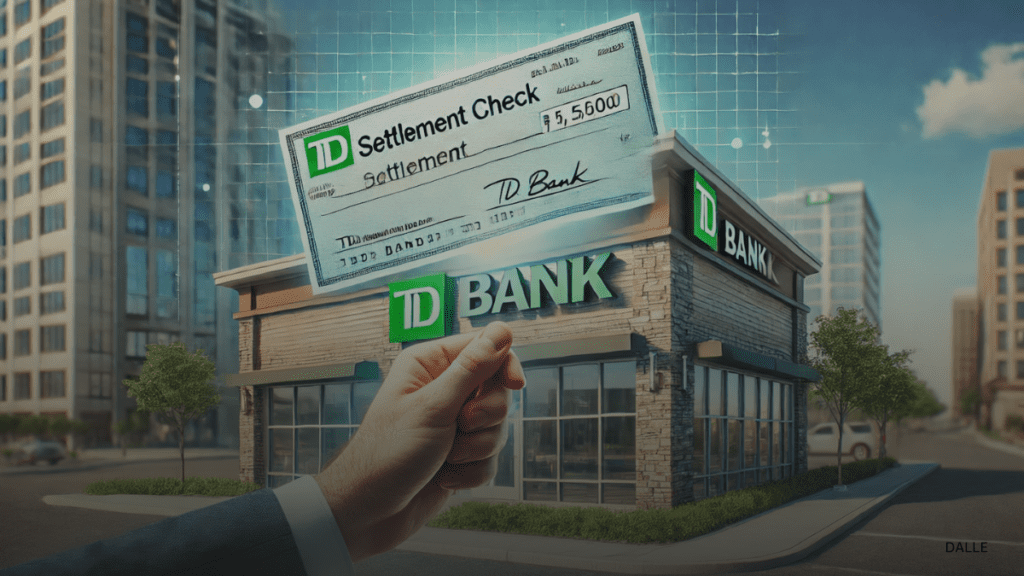Introduction
Hey Hustlers! Have you been hit with multiple non-sufficient funds (NSF) fees by TD Bank? If so, there’s good news on the horizon. A significant class-action settlement has been reached, offering compensation to affected customers. Let’s dive into the details of the TD Bank Class Action Settlement Claim 2024, and see if you’re eligible for a payout.

Key Takeaway Box
- Settlement Amount: $15.9 million
- Eligibility: Canadian residents with TD personal deposit accounts charged NSF fees on re-presented pre-authorized debit transactions between Feb. 2, 2019, and Nov. 27, 2023.
- Estimated Payout: Approximately $88 per eligible account
- Important Dates: Claim submission deadline – May 13, 2024. Payments expected by end of June 2024.
Understanding the TD Bank Settlement 2024
In 2021, TD Bank faced a lawsuit for allegedly charging customers multiple NSF fees for single transactions. These fees were applied whenever an insufficient funds transaction was retried, leading to multiple charges for a single instance. The case, certified as a class action, resulted in a $15.9 million settlement.
Settlement Details and Amount
The $15.9 million settlement will be distributed among eligible class members. This amount includes legal fees, administration costs, and a $10,000 honorarium to the representative plaintiff. After these deductions, the remaining funds will be divided among the affected customers.
| Total Settlement | Deductions (Legal Fees, Administration, Honorarium) | Amount for Distribution |
|---|---|---|
| $15.9 million | Legal fees, Administration costs, $10,000 honorarium | Approximately $9.74 million |
Eligibility Criteria
To be eligible for the settlement, you must:
- Be a Canadian resident.
- Have an open personal deposit account with TD Bank.
- Have been charged an NSF fee on a re-presented pre-authorized debit transaction between Feb. 2, 2019, and Nov. 27, 2023.
How to Claim Your Settlement
Eligible customers will automatically receive their compensation directly into their TD personal deposit accounts, with payments starting in early April 2024. No additional action is required for those who qualify. However, if you wish to opt out or object to the settlement, you must submit the necessary forms by January 26, 2024.
| Important Dates | Details |
|---|---|
| Claim Submission Deadline | May 13, 2024 |
| Opt-Out/Objection Deadline | January 26, 2024 |
| Payment Distribution | Expected by end of June 2024 |
FAQs
Why was TD Bank sued?
TD Bank was sued for allegedly charging multiple NSF fees on single transactions, which customers claimed was unfair and not disclosed properly.
How much is the settlement amount?
The settlement amount is $15.9 million.
Who is eligible for the settlement?
Canadian residents with TD personal deposit accounts charged NSF fees on re-presented pre-authorized debit transactions between Feb. 2, 2019, and Nov. 27, 2023.
How much will I receive?
Eligible customers can expect to receive approximately $88 per account.
When will I get paid?
Payments will start in early April 2024 and are expected to be completed by the end of June 2024.
How do I submit a claim?
Eligible customers do not need to submit a claim. Payments will be made automatically to qualifying accounts.
Can I opt out of the settlement?
Yes, you can opt out by submitting the necessary forms by January 26, 2024, if you do not want to be legally bound by the settlement.
Conclusion
The TD Bank Class Action Settlement Claim 2024 provides a chance for affected customers to receive compensation for unfair NSF fees. Make sure you meet the eligibility criteria and be aware of the important dates to ensure you receive your payout. For more detailed information, visit the official settlement website.
Stay updated and informed with Hustlehub.


